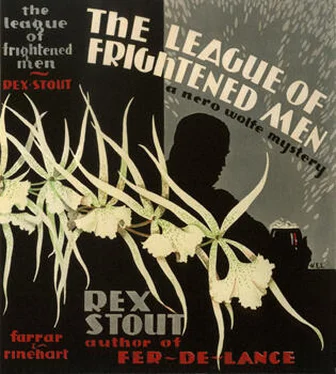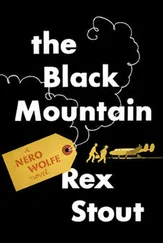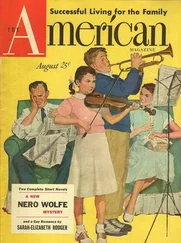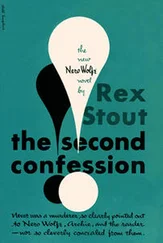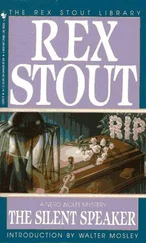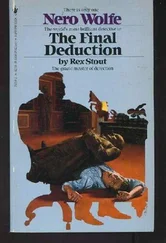I only got two of the remaining three, couldn’t find Roland Erskine anywhere. As it was, we had done pretty good. A telegram had come from Boston saying that Collard and Gaines would be there, and Mollison was coming down from New Haven. I suspected that Wolfe would have handled the long distance babies himself even if I hadn’t been in bed.
Wolfe didn’t come to the office directly from the plant-rooms at six o’clock as usual. Apparently he had stopped in his room, for when he appeared around six-thirty he was lugging a stack of books and I saw they were Paul Chapin’s novels. He put them on his desk and sat down and rang for beer.
I told him Mrs. Chapin had the box, and read him the notes of my afternoon call on Mrs. Burton. He gave me some instructions for the evening, which I made notes of because he liked to have everything down, and then he got playful. He made a lot of random remarks and I took them like a gentleman, and then because it was getting on towards dinner I observed that it was about time I got acquainted with the mystery of the pair of gloves on the foyer table. To my surprise he agreed with me.
He said: “That was the contribution of Mrs. Chapin. She furnished other information too, but nothing as interesting as that. She arrived at the Burton apartment, as you know, at six-thirty. The maid called Rose let her in. As she passed through the foyer she saw a pair of gloves on the table, and she stopped to pick them up. She says she intended to take them in to Mrs. Burton, but it would not be charitable to surmise that she had in mind starting a new treasure box for her husband; and that it is supported by the reasons she gives for returning the gloves to the table. She gives two reasons: that the maid had turned and was looking at her, and that the gloves seemed a little heavier than any she had known Mrs. Burton to wear. At any rate, she left them there. But when she went through the foyer, alone, on the way out, she thought to look at them again to satisfy herself whether they were Mrs. Burton’s or not. The gloves were gone. She even looked around for them. They were gone.”
“I see. And that proves she didn’t croak Burton.”
“It does. And it identifies the murderer. If it should turn out that factual corroboration is needed of Mrs. Chapin’s innocence, which seems unlikely, it can be established that at half past seven she was receiving a summons from a policeman at Park Avenue and Fiftieth Street for passing a red light. Not to mention the probability that the hallman and doorman saw her leaving the building before the event occurred. But none of that should be needed.”
“Uh-huh. I suppose you got her confidence by giving her some orchids.”
“No. But as a matter of fact, I promised her some. Make a note of that for tomorrow. I got her confidence by telling her the truth, that the conviction of her husband for murder would cost me many thousands of dollars. You see, what happened — what time is it?—Good. She was convinced, as was Chapin himself, that I was responsible for his predicament. Not knowing the nature of my agreement with his friends, he thought I had framed him. Having seen me, he could not of course suppose that I myself had performed the acrobatics in the foyer. Do you know who did that? You. Yes, indeed, you did the killing, I merely devised it. Mrs. Chapin, believing that, seized an opportunity. With you and Pitney Scott fast asleep, she went through your pockets, took his cap and jacket, sat down and wrote a note, and drove the taxicab here. She handed the envelope to Fritz at the door and returned to the cab. The note was brief and quite clear, I can quote it verbatim: Archie Goodwin will be dead in two hours unless you get in my taxi and go where I drive you. And it was signed with her name, Dora Chapin. Admirably forthright. What persuaded me that some sort of action was called for was the presence in the envelope of the leather case you had seemed to like.”
He paused for a glass of beer. I grunted, and thought I ought to say something, but all I could think of was, “Yeah, I liked it. And you’ve still got it.”
He nodded, and resumed. “The only aspect of the episode that was really distressing came from Mrs. Chapin’s romantic idea of what constitutes a remote and secluded spot. Since I was committed to follow her, a bush in a corner of Central Park would have done her just as well, but that infernal female ass bounced that cab far beyond the limits of the city. I learned subsequently that she had in mind an isolated wood somewhere on the edge of Long Island Sound where she and her husband had gone last summer to have a picnic. It became unendurable. I lowered the glass between us and shouted at the back of her ear that if she did not stop within three minutes I would call for help at every passing car and every visible human being. I convinced her. She turned into a byroad and soon stopped under a clump of trees.
“This will amuse you. She had a weapon. A kitchen knife!—By the way, that carving she exhibited to us last Wednesday was done on her own initiative; her husband disapproved. At that time the game was still on of establishing Mr. Chapin in the minds of his friends as a dangerous and murderous fellow, without involving him in any demonstrable guilt. He already suspected that I might uncover him, and his wife’s bloody neck was a red herring, though her own idea.—Well. She could not very well have expected to kill me with a knife, since none could be long enough to reach a vital spot; I suppose no gun was available, or perhaps she mistrusts them as I do. Perhaps she meant merely to hack me into acquiescence; and of course she had in reserve my anxiety as to the peril of your situation. At all events, her purpose was to force me to reveal the skulduggery by which her husband had been entrapped. I was to write it. She had pen and paper with her. That attention to detail endeared her to me.”
“Yeah. And?”
He drank beer. “Nothing much. You know my fondness for talking. It was an excellent opportunity. She was calm from the outset. She and I have much in common — for instance, our dislike of perturbation. It would have been instructive to see her using the knife on the back of her neck that day, I would wager she did it much as one trims a chop. After I had explained the situation to her, we discussed it. The moment arrived when it seemed pointless to continue our conference in that cold, dark forbidding spot, and besides, I had learned what had happened to you. She seemed so uncertain as to what she had used to flavor your coffee that I thought it best to reach a telephone with as little delay as possible.—Ah! Mr. Hibbard, I trust the long afternoon has been fairly tolerable.”
Hibbard walked in, looking a little groggy, still wearing my brown necktie. Behind him came Fritz, to announce dinner.
They piled in early. By nine o’clock ten of them had already arrived, checked off on my list, and I was doing the honors. Four of them I hadn’t seen before: Collard and Gaines from Boston, Irving from Philadelphia and Professor Mollison of Yale. Mike Ayers, stony sober on arrival, helped me get drinks around. At nine sharp Leopold Elkus joined the throng. I had no idea what Wolfe had told him to get him there; anyway there he was, and what he wanted to drink was a glass of port, and I restrained an impulse to tell him there was no nitroglycerin in it. He recognized me and acted gracious. Some more came, among them Augustus Farrell, who had phoned on Saturday that he was back from Philadelphia and had landed the commission for Mr. Allenby’s library. Wolfe, surmising that what he was really phoning about was the twenty bucks due him for Wednesday’s work, had had me mail him a check.
They didn’t seem as subdued as they had a week before. They took to the drinks with more gusto, and gathered in groups and talked, and two or three of them even came up to me and got impatient. Collard, the Boston textile man who owned the cliff that Judge Harrison had fallen off of, told me he hoped to see the last act of the opera, and I said I was sorry but I myself had had to give up that hope long ago. I overheard Elkus telling Ferdinand Bowen that it appeared likely that Nero Wolfe was in an advanced stage of megalomania, and tried to get Bowen’s reply but missed it.
Читать дальше
